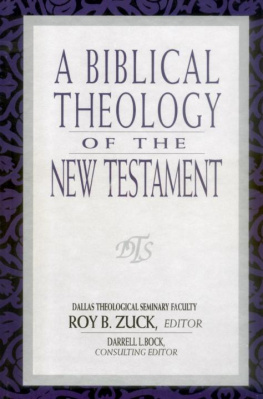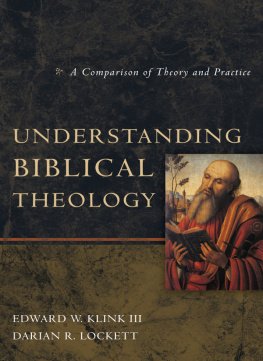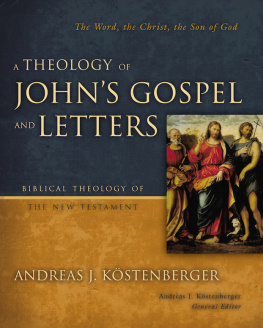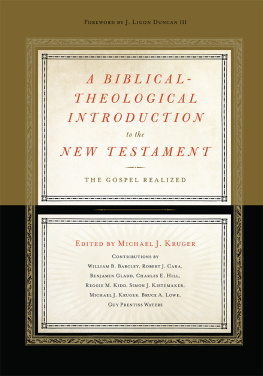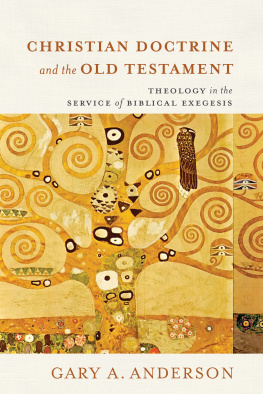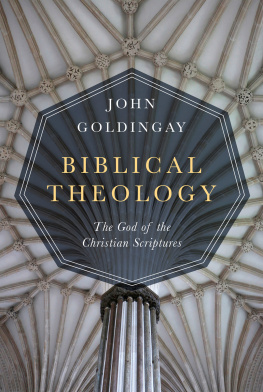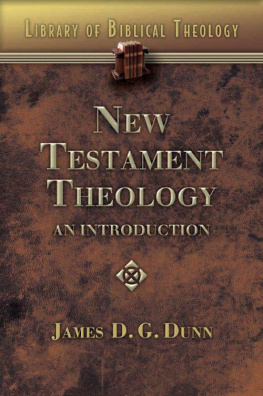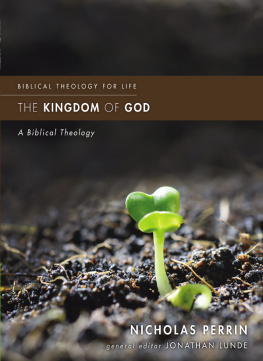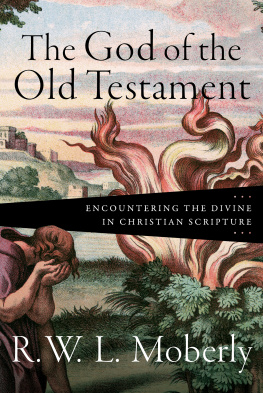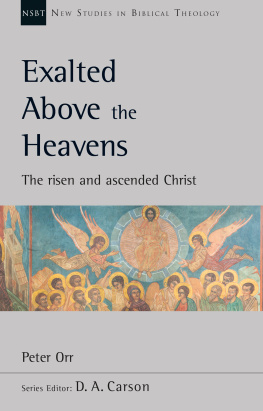Roy Zuck - A Biblical Theology of the New Testament
Here you can read online Roy Zuck - A Biblical Theology of the New Testament full text of the book (entire story) in english for free. Download pdf and epub, get meaning, cover and reviews about this ebook. year: 2011, genre: Religion. Description of the work, (preface) as well as reviews are available. Best literature library LitArk.com created for fans of good reading and offers a wide selection of genres:
Romance novel
Science fiction
Adventure
Detective
Science
History
Home and family
Prose
Art
Politics
Computer
Non-fiction
Religion
Business
Children
Humor
Choose a favorite category and find really read worthwhile books. Enjoy immersion in the world of imagination, feel the emotions of the characters or learn something new for yourself, make an fascinating discovery.
- Book:A Biblical Theology of the New Testament
- Author:
- Genre:
- Year:2011
- Rating:3 / 5
- Favourites:Add to favourites
- Your mark:
- 60
- 1
- 2
- 3
- 4
- 5
A Biblical Theology of the New Testament: summary, description and annotation
We offer to read an annotation, description, summary or preface (depends on what the author of the book "A Biblical Theology of the New Testament" wrote himself). If you haven't found the necessary information about the book — write in the comments, we will try to find it.
Roy Zuck: author's other books
Who wrote A Biblical Theology of the New Testament? Find out the surname, the name of the author of the book and a list of all author's works by series.
A Biblical Theology of the New Testament — read online for free the complete book (whole text) full work
Below is the text of the book, divided by pages. System saving the place of the last page read, allows you to conveniently read the book "A Biblical Theology of the New Testament" online for free, without having to search again every time where you left off. Put a bookmark, and you can go to the page where you finished reading at any time.
Font size:
Interval:
Bookmark:





FROM MEMBERS OF DALLAS TIEOLOGICAL FACULTY
ROY B. ZUCK, EDITOR

DARRELL L.BOCK, CONSULTING EDITOR
To Dr. Stanley D. Toussaint, beloved colleague and esteemed professor who taught the New Testament to each of the contributors to the volume when they were students at Dallas Theological Seminary Dr. Toussaint served on the Dallas Seminary faculty from 1960 to 1968 and from 1973 to 1993
Roy B. Zuck (A.B., Biola University; Th.M., Th.D., Dallas Theological Seminary), general editor, is Senior Professor Emeritus of Bible Exposition at Dallas Theological Seminary. He is editor of Bibliotheca Sacra and coeditor of The Bible Knowledge Commentary. He is also the author of Open Letter to a Jehovah's Witness and the Everyman's Bible Commentary on Job.
Darrell L. Bock (Th.M., Dallas Theological Seminary; Ph.D., University of Aberdeen), consulting editor, New Testament, is associate professor of New Testament studies at Dallas Theological Seminary and minister of the Word at Trinity Fellowship in Richardson, Texas. He is the author of Proclamation from Prophecy and Pattern.
ROY B. ZUCK (B.A., Biola Univ.; Th.M., Th.D., Dallas Theological Seminary) is department chairman and senior professor of Bible exposition at Dallas Theological Seminary. Most recently, he was listed in Who's Who in American Education (1991-92), International Directory of Distinguished Leadership (1994), and Directory of International Biography (1994).
Books written or edited by Roy B. Zuck: A Biblical Theology of the Old Testament; Adult Education in the Church; Barb, Please Wake Up!; Basic Bible Interpretation; The Bib Sac Reader; The Bible Knowledge Commentary; Biblical Archaeology Leader's Guide; Childhood Education in the Church; Christian Youth: An In-Depth Survey; Church History Leader's Guide; Creation: Evidence from Scripture and Science; Communism and Christianity Leader's Guide; Devotions for Kindred Spirits; The Holy Spirit in Your Teaching; How to Be a Youth Sponsor; Job (Everyman's Bible Commentary); Reflecting with Solomon: Studies on the Book of Ecclesiastes; Sitting with Job: Selected Studies on the Book of Job; The Life of Christ Commentary; Vital Biblical Issues; Vital Contemporary Issues; Vital Ministry Issues; Vital Theological Issues; Youth and the Church; Youth Education in the Church
DARRELL L. BOCK (B.A., Univ. of Texas at Austin; Th.M., Dallas Theological Seminary; Ph.D., Univ. of Aberdeen in Scotland) is professor of New Testament Studies at Dallas Theological Seminary. His books include Proclamation from Prophecy and Pattern (1987); Luke, 2 vols. (1994, 1995); and Luke (1994). He is also coeditor of Dispensationalism, Israel, and the Church: The Search for Definition (1992) and coauthor of Progressive Dispensa- tionalism (1993), as well as a contributor to many other books.
Systematic theology has been designated as the "queen of the sciences." It is the investigation of God and His universe. Thus, theology involves observing special revelation, God's inspired Word, and natural revelation-God's creation-and their relationship to each other. To examine special revelation, the theologian must investigate the contents of the Scriptures. This is exegesis. Then specific passages must be examined in light of the theological framework of the specific work of the writer of Scripture. This is biblical theology. This step attempts to prevent the theologian from taking passages out of context or bending passages of Scripture to fit a personal theology.
The role of biblical theologians is a difficult one. On the one hand, the exegete may think that some of the ramifications of the debate have not been taken seriously by biblical theologians. On the other hand, systematic theologians could think that the theological deductions of biblical theologians do not go far enough. It is a delight to see that in the present volume there has been a careful examination of the fruits of exegesis in an attempt to determine the theology of the writers of the New Testament. A good systematic theology is based on the fruits of good biblical theology, which in turn is based on good exegesis.
The present work deals not only with historical interpretations of the biblical texts but also with the contemporary discussion of those passages and Bible books. The authors discuss various views on passages that have a bearing on the theological teachings of the specific scriptural writers and have been fair in expressing these various interpretations and judicious in their critiques. In reading this work, one does not sense that the authors have axes to grind or hobby horses to pursue.
So many times theology is difficult to read, not necessarily because it is deep but because it is muddled with complex language. But this book is easy to read. This volume can be used by the church at large-it is not reserved for the intellectual few. It will serve as a handy tool for those who expound the Scriptures. Teachers and preachers will gain knowledge of the contents of particular problem passages in the New Testament and will also see the relationship of those passages to the development of the scriptural writers' theology and how it then contributes to the theology of the Bible as a whole.
With the present-day pandemic tendency to do what is expedient, this work is a welcome counterbalance. Christians should not be easily influenced by forces either secular or sacred but should follow biblical mandates. All too often Christians are encouraged to take actions on the basis of poor exegesis or sloppy theology. When believers read this book, they will gain insight into God's character and what He desires of them.
Font size:
Interval:
Bookmark:
Similar books «A Biblical Theology of the New Testament»
Look at similar books to A Biblical Theology of the New Testament. We have selected literature similar in name and meaning in the hope of providing readers with more options to find new, interesting, not yet read works.
Discussion, reviews of the book A Biblical Theology of the New Testament and just readers' own opinions. Leave your comments, write what you think about the work, its meaning or the main characters. Specify what exactly you liked and what you didn't like, and why you think so.

